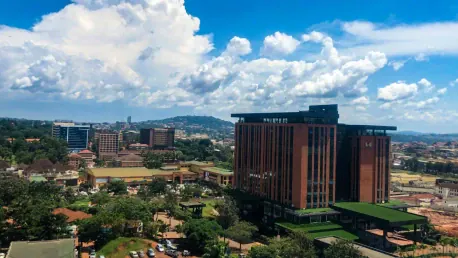The transition in Uganda’s electricity distribution sector is underway as Umeme Limited’s 20-year concession ends. With the state-owned Uganda Electricity Distribution Company (UEDCL) poised to take over, this shift has stirred tensions, primarily surrounding Umeme’s significant compensation claim. The implications are vast, affecting tariffs, infrastructure investments, and Uganda’s allure to future investors.
Controversy Over Compensation
Umeme’s Compensation Demand
At the core of the controversy is Umeme Limited’s substantial compensation demand of US$235.96 million for its undepreciated and unrecovered investments made during its tenure as Uganda’s leading electricity distributor. Initially, the auditor general estimated these unrecovered investments at US$190.99 million, a figure that was subsequently reevaluated and reduced to US$118 million, which the government has already paid to Umeme. However, Umeme disputes this amount as the full and final settlement for its claims and is expected to seek additional compensation to cover the remaining calculated gap. This contentious issue could have long-term implications for financial sustainability and infrastructure investments in Uganda’s energy sector.
The reduction in compensation has created friction between Umeme Limited and the government, with the company’s board likely to pursue the remainder of the claim to safeguard shareholders’ interests. Should the government fail to settle the outstanding balance by the agreed-upon deadline, Umeme may seek penalties as part of its efforts to recover the remaining funds. This ongoing dispute underscores the complexity of transitioning from private to public governance in the electricity distribution sector, highlighting the need for transparent negotiations and fair compensation to ensure a smooth and equitable transition.
Government’s Stance
In adopting the auditor general’s valuation of US$118 million as the compensation amount, the Ugandan government has established this figure as the initial asset base for the Uganda Electricity Distribution Company Ltd (UEDCL). This decision has sparked controversy by leaving a significant gap between the claimed compensation amount and the paid value. The unresolved disparity raises concerns about future public-private partnerships in Uganda, as it sets a precedent for how compensation disputes will be handled in similar transitions. Furthermore, the government must navigate this transition carefully to avoid undermining investor confidence and deterring future investments in the energy sector.
The discrepancy between Umeme’s demanded compensation and the government’s payment signifies broader challenges within Uganda’s electricity distribution transition. The dispute has potential repercussions on UEDCL’s capacity to secure necessary funding for infrastructure investments and maintain service quality. As such, the resolution of this financial wrangle is pivotal not only for immediate fiscal stability but also for the long-term sustainability of Uganda’s electricity distribution and its attractiveness as an investment destination. The government’s handling of this situation will profoundly influence the perception of Uganda’s reliability and integrity in managing public-private ventures.
Implications of the Transition
Impact on Electricity Tariffs
The compensation amount directly ties into UEDCL’s asset base, significantly impacting how electricity tariffs are set in the future. A higher asset base could reflect substantial capital investments made by UEDCL, ensuring revenue sufficiency to cover operational costs, expenses, and depreciation. Such a financial structure would likely result in stable or potentially reduced tariffs due to improved efficiency and service delivery. Conversely, a lower asset base might indicate underinvestment, leading to deteriorating service quality and higher long-term operational costs, which would consequently raise electricity tariffs for consumers.
This dynamic underscores the importance of adequately compensating Umeme to ensure UEDCL inherits a robust asset base capable of sustaining investments in modernizing infrastructure and expanding electricity access. The future of electricity tariffs in Uganda depends on the government’s ability to balance immediate financial constraints with long-term strategic goals. A seamless transition, coupled with sufficient initial capital and continued investment, is crucial in maintaining affordable and reliable electricity services for Ugandan consumers while also stimulating economic growth through improved energy infrastructure.
Financial Sustainability and Investments
Umeme’s governance and effective revenue collection mechanisms have played a significant role in attracting investments in Uganda’s electricity generation sector over the past two decades. With Umeme’s departure, maintaining this investment momentum under public governance poses a considerable challenge. The manner in which this transition is managed will either enhance or diminish Uganda’s reputation as a reliable investment hub. Investors will be closely monitoring government actions to assess the risk associated with future investments in Uganda’s electricity sector. Ensuring financial sustainability and a favorable investment climate will be critical in attracting and retaining private capital for essential infrastructure projects.
The government faces the task of building strong governance systems within UEDCL to ensure that service delivery standards are maintained without disruption. This involves adopting best practices from Umeme’s successful revenue collection and operational strategies to preserve investor confidence and commitment. Strengthening regulatory frameworks, fostering transparency, and creating an environment conducive to investment are essential steps the government must take to ensure UEDCL’s financial viability and the broader sector’s attractiveness to investors. Successfully navigating this transition will have far-reaching effects on Uganda’s ability to sustain growth and development in its electricity distribution network.
Strategic Recommendations for the Government
Effective Negotiation and Funding
To mitigate the risks associated with this transition and foster a seamless and amicable settlement with Umeme, the government could benefit greatly from forming a dedicated negotiation team comprising legal, financial, regulatory, and energy experts. This team would be responsible for reconciling valuation differences and negotiating a final compensation amount that is agreeable to both parties. Additionally, securing financing proactively to avoid penalty interests and ensure timely payment is crucial in minimizing financial strain and maintaining investor confidence. By addressing these challenges strategically, the government can prevent escalation into contentious disputes and preserve Uganda’s reputation as a reliable investment destination.
Effective negotiation and securing appropriate funding would also involve engaging with local and international experts to ensure that valuation methodologies and compensation mechanisms are transparent and fair. Incorporating third-party assessments and stakeholder consultations throughout the negotiation process could help in achieving a balanced resolution that protects the interests of both Umeme and the Ugandan government. Moreover, clear communication with all involved parties, including investors and the public, would be vital in maintaining trust and ensuring support for the transition. By taking these measures, the government can facilitate a credible and sustainable resolution to the compensation dispute.
Strengthening UEDCL and Governance Systems
Building robust governance systems within UEDCL is essential for ensuring a seamless transition in electricity distribution and maintaining high service delivery standards. The government must focus on equipping UEDCL with the necessary tools, resources, and expertise to manage its operations effectively. This involves hiring skilled personnel, implementing efficient operational frameworks, and adopting advanced technologies to enhance service reliability and customer satisfaction. Furthermore, ensuring compliance with regulatory standards and maintaining transparency in UEDCL’s activities will be crucial for gaining public and investor trust.
Additional focus on creating strong oversight mechanisms and accountability structures will help UEDCL manage its assets prudently and efficiently. Establishing clear, measurable performance metrics and regularly evaluating UEDCL’s progress can drive improvements in service delivery and operational efficiency. Building partnerships with experienced international entities and leveraging their knowledge and best practices can also contribute to strengthening UEDCL’s governance systems. Ultimately, these efforts will support a smooth transition, uphold service quality, and foster a sustainable and resilient electricity distribution sector in Uganda.
Public and Private Sector Collaboration
Transparent Communication
Maintaining transparency and keeping all stakeholders informed throughout this transition are paramount for bolstering public trust and investor confidence. Clear and consistent communication about the progress, challenges, and decisions related to the electricity distribution transition can help manage expectations and avert misinformation. By showcasing a commitment to transparency, the government can reassure investors and the public about its dedication to a fair and efficient transition process. This approach is critical for maintaining stability and fostering a collaborative environment.
Additionally, engaging stakeholders at every stage of the transition process ensures that their concerns and insights are considered. Regular updates through media outlets, public forums, and digital platforms can provide timely information and promote open dialogue. Establishing channels for feedback and addressing queries promptly would further enhance stakeholder engagement. Transparent communication helps in building a unified vision for the future of Uganda’s electricity distribution sector and encourages cooperative efforts towards achieving sustainable growth and improved service delivery.
Encouraging Private Investment
Uganda’s electricity distribution sector is experiencing a significant transition as Umeme Limited’s 20-year concession draws to a close. The Uganda Electricity Distribution Company Limited (UEDCL), a state-owned entity, is set to take over the distribution, marking a substantial shift in the industry. This transition is sparking tensions, particularly due to Umeme’s substantial compensation claim for the investments they have made over the years. The ripple effects of this change are considerable, with potential impacts on electricity tariffs, infrastructure investments, and the overall attractiveness of Uganda for future investors. The changeover brings both opportunities and challenges, as the government aims to enhance efficiency and ensure reliable power supply while addressing the concerns of existing stakeholders. The unfolding developments are critical for the country’s economic landscape, shaping the future trajectory of Uganda’s energy sector as it seeks to balance modernization with sustainable growth.









